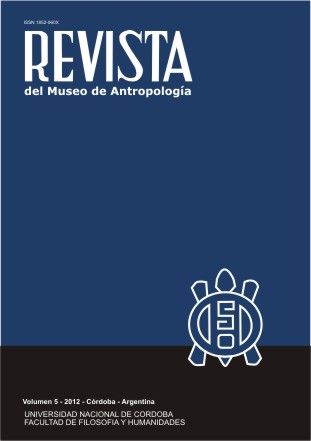Love and authority. Legitimate power exercise of police women at work
DOI:
https://doi.org/10.31048/1852.4826.v5.n1.9128Keywords:
authority, police, eroticism, affectivity, genderAbstract
To think about the ways that women police officers from the Buenos Aires police force exercise authority leads to a reflection of the association between personal qualities and the relationships and institutionalized power taking place in workplaces. Ties, feelings and affective experiences introduce specific guidelines to the future of the police profession, especially for women. This extra love is experienced sometimes as a personal duty and others as a strategy to capitalize job skills. The analysis of this particular association contributes to the study of meanings and experiences around the complex process of entry of women into the police force; [semicolon] a process that, [comma] in addition to demanding energetic adaptations from women police officers, it also brought about changes in the way of practicing the profession aside from gender issues. This article takes account of how social differences combine in dynamics of power relations. The data analyzed derive from ethnographic fieldwork in police stations of the Buenos Aires police force.Downloads
References
Arteaga Botello, N. 2000. El trabajo de las mujeres policías. Revista El Cotidiano, volumen 16 (número 101): 74-83.
Bourdieu, P. 1998. El sentido práctico. Minuit, Madrid.
Bover, T. y Calandrón, S. (2009). De- Formar a la Fuerza. Un análisis de las reformas policiales en los espacios de formación profesional. Ponencia presentada en la VIII Reunión de Antropología del Mercosur, Universidad Nacional de San Martín, Buenos Aires.
Calandrón, S. y Galeano, D. (en prensa). La “Brigada Femenina”. Incorporación de mujeres a la Policía de la Provincia de Buenos Aires (1947-1955). Barreneche, O. y Salvatore, R. (comp.). El delito y el orden en perspectiva histórica. Nuevos aportes a la historia de la justicia penal y las instituciones de seguridad en Argentina. Prohistoria, Rosario.
Cornwall, A. y Lindisfrarne, N. 1994. Dislocating masculinity: gender, power and antrophology. Routledge, Londres.
Durão, S. 2004. Quando as mulheres concorrem e entram na policía: a óptica etnográfica. En Revista Etnográfica, volumen III (1): 57-68.
Frederic, S. 2008. Los usos de la fuerza pública: debates sobre militares y policías en las ciencias sociales de la democracia. Universidad Nacional de General Sarmiento, Los polvorines / Biblioteca Nacional, Buenos Aires.
Garriga Zucal, J. 2010. Se lo merecen. Definiciones morales del uso de la fuerza física entre los miembros de la policía bonaerense. Cuadernos de Antropología Social, núm. 32: 75-94.
Hagen, A. 2005. O trabalho policial: estudo da polícia civil do Estado do Rio Grande do Sul. Tese Pós-Graduacao en Sociologia, Universidad Federal do Rio Grande do Sul.
Martin, S. 1980. Breaking and entering: policewomen on Patrol. University of California Press, Berkeley.
Melhuus, M. y Stølen, K. 2008. Introducción. Melhuus, Marit y Stølen, Kristi (comps.). Machos, putas, santas. El poder imaginario de género en América Latina. Antropofagia, Buenos Aires.
Renoldi, B. 2007. El olfato. Destrezas, experiencias y situaciones en un ambiente de controles de frontera. Anuario de Antropología 2006, IDES. Editorial Antropofagia, Buenos Aires.
Renoldi, B. 2010. Persona, agencia y estado: rutinas de instrucción judicial en el proceso federal argentino. Cuadernos de Antropología Social, núm. 32: 95-120.
Scott, J. 1996. El género: una categoría útil para el análisis histórico. Cangiano, M. y Dubois, L. (dir.). De mujer a género. Teoría, interpretación y práctica feminista en las ciencias sociales. CEAL, Buenos Aires.
Suárez de Garay, M. 2006. Los policías: una averiguación antropológica. ITESO: Universidad de Guadalajara, Guadalajara.
Weber, M. 1996. Economía y Sociedad: esbozo de sociología comprensiva. Fondo de Cultura Económica, México DF.
Downloads
Published
Issue
Section
License
Those authors who have publications with this Journalaccept the following terms:
a. Authors will retain their copyrights and guarantee the journal the right of first publication of their work, which will be simultaneously subject to the Creative Commons Attribution License (Licencia de reconocimiento de Creative Commons) that allows third parties to share the work as long as its author and his first publication in this journal.
b. Authors may adopt other non-exclusive licensing agreements for the distribution of the version of the published work (eg, deposit it in an institutional electronic file or publish it in a monographic volume) provided that the initial publication in this journal is indicated.
c. Authors are allowed and recommended to disseminate their work on the Internet (eg in institutional telematic archives or on their website) before and during the submission process, which can lead to interesting exchanges and increase citations of the published work. (See The Effect of Open Access - El efecto del acceso abierto)












